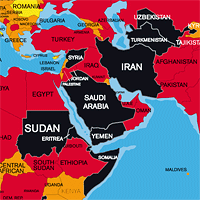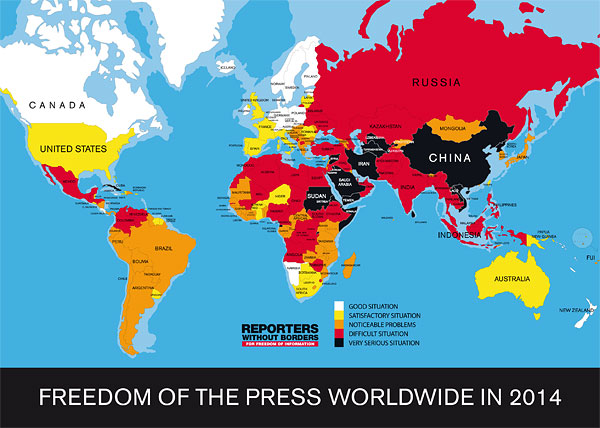Press less free in 2013, says Reporters without Borders; incidents of assault, threats increasing
posted Tuesday, February 18, 2014 at 6:44 PM EDT

The World Press Freedom Index 2014 is out, and it makes for interesting reading. The index shines a spotlight both on the places where those in the media (including photojournalists and videographers) are free to do their job unhindered. It also identifies the black spots where their reportage may actually put their freedom -- or their lives -- at risk.
Compiled by Reporters without Borders, the index now tracks changes in press freedom in 180 countries around the globe, including one new entry: Belize, which makes its debut in a respectable 29th place. As you can see in the map below, the Western world still leads the way in terms of press freedom, with a good or at least satisfactory situation in most of North America, Europe, and Oceania. Southern Africa, too, does better than most in its rankings. That's not to say that everything is rosy, however.
Among the countries showing the biggest erosion in press freedom over the last year is the United States, which falls 13 places to 46th on the list. Explaining their reason for the US' stumble, Reporters without Borders calls attention, in particular, to treatment of whistleblowers, leakers, and those who assist them. The United Kingdom also showed a more marked decline than many of its Western world cousins, falling three places for similar reasons.
On the other end of the scale, Caribbean / Central and South American nations including Panama, Ecuador, Bolivia, and the Dominican Republic all showed marked improvement, with Panama and Ecuador in particular each registering a 25-place gain in their rankings. While the situation in each is still challenging, Reporters without Borders cited a reduction in "violence against journalists, direct censorship and misuse of judicial proceedings" as a reason for the climb up the scales.

Of course, there's more to it than whether any given nation has bettered its position in the rankings or not. When you're near the top, registering an improvement becomes more difficult, and the converse is equally true. The conflict-stricken Middle East and parts of Asia, in particular, are called out as areas with "very serious" issues when it comes to press freedom. Eritrea, North Korea, and Turkmenistan retained their unwelcome status as the least-free nations on the list, with freedom of information described as "non-existent", and China didn't fare much better.
Overall, the index showed a decline in press freedom globally, with all continents except Asia becoming less free than a year ago. 2013 was less deadly for journalists, says Reporters without Borders, but incidence of assaults and threats against the media were on the rise.
The report mentions photographers and videographers several times across its seven pages. Incidents that Reporters without Borders calls attention to in particular include the targeting of photojournalists and TV crews by the Israel Defence Forces, as well as Russia's lengthy detention of a Russian photographer and British videographer covering Greenpeace protests in the Arctic. Also mentioned is Russia's ban of a book collecting the winning photos from the 2011 Belarus Press Photo competition, with 41 copies of the book first confiscated from contest organizers and one of the winners, then later destroyed.
More details on the 2014 index can be found on the Reporters without Borders website.